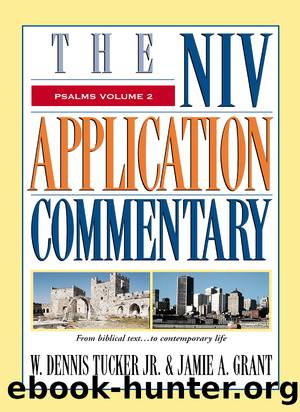Psalms, Volume 2 by W. Dennis Tucker Jr. & Jamie A. Grant

Author:W. Dennis Tucker, Jr. & Jamie A. Grant [Tucker Jr., W. Dennis & Grant, Jamie A.]
Language: eng
Format: epub
Publisher: Zondervan Academic
Published: 2018-07-02T00:00:00+00:00
Provoking Yahweh through Idolatry (106:28â33)
THEY YOKED THEMSELVES TO THE BAAL OF PEOR. As in the book of Judges, just when the reader thinks that things could not possibly get any worse, events nosedive further. Five of the six verses in this stanza begin with the waw-conjunction (âthen,â âand,â or âbutâ) and the sixth with the causative ki (âforâ). Their âyokingâ leads to a string of events that shows the ups and downs of a communityâs unraveling and veering away from its true identity. âThen they yoked themselves . . .,â âand they ate . . .,â âbut Phineas stood up . . .,â âand this was credited . . .,â âbut they angered the LORD . . .,â âfor they rebelled. . . .â Even the actions of the best of Israelites (Phineas and Moses) could not save that generation from their rebellion. The lack of belief and obedience highlighted in the previous stanza ultimately manifests itself in idolatry. Verse 28b refers, literally, to the âsacrifices to the deadââpossibly offerings made on behalf of dead ancestors (a practice prohibited in Deut 26:14), but the NIVâs translation is probably to be preferred here. Following on from the reference to the golden calf as a metal image of a thing that eats grass (Ps 106:19â20), the psalmist reminds the reader that these gods are dead, âsacrifices offered to lifeless gods.â34
But Phineas stood up and intervened. The events of Numbers 25 describe an idolatrous orgy of cultic prostitution quelled only by the radical intervention of Phineas. The language echoes the actions of Moses in Psalm 106:23 and presents Phineas as an intermediary who is zealous for Godâs purposes to be fulfilled (Num 25:13). His intervention stayed the immediate punishment but was not enough to secure obedience on the part of the people. Just as Mosesâ prayer saved them from destruction (Ps 106:23), so Phineasâ intervention saved them from the plague, but neither of these representative actions was enough to bring a change of heart and behavior on the part of the people.
By the waters of Meribah they angered the LORD. The place name Meribah is a byword for the failure of Godâs people (Exod 17:1â7; Num 20:1â13; Ps 95:8). As we have already seen above regarding food in the desert (Ps 106:13â15), it is the revisionist take on their shared history in Egypt and the associated aspersions cast regarding Godâs good character and good plan that provoke Godâs anger. The addition of âand trouble came to Moses because of themâ refers to Numbers 20:9â12 and adds the image of communal sinâs bringing down even a leader of great faith and obedience. Faithlessness has repercussions.
For they rebelled against the Spirit of God. As footnoted in the NIV, there is a translational issue here. The text simply alludes to the fact that âthey rebelled against his spirit.â So, the question becomes, Is this a reference to Yahwehâs Spirit or to Mosesâ spirit? Either option is possible, but the latter is more likely. Note the flow
Download
This site does not store any files on its server. We only index and link to content provided by other sites. Please contact the content providers to delete copyright contents if any and email us, we'll remove relevant links or contents immediately.
| Exegesis & Hermeneutics | New Testament |
| Old Testament |
The Five People You Meet in Heaven by Mitch Albom(3569)
The Secret Power of Speaking God's Word by Joyce Meyer(3222)
Real Sex by Lauren F. Winner(3023)
Name Book, The: Over 10,000 Names--Their Meanings, Origins, and Spiritual Significance by Astoria Dorothy(2987)
The Holy Spirit by Billy Graham(2953)
0041152001443424520 .pdf by Unknown(2846)
How The Mind Works by Steven Pinker(2816)
ESV Study Bible by Crossway(2778)
Ancient Worlds by Michael Scott(2689)
Churchill by Paul Johnson(2587)
The Meaning of the Library by unknow(2573)
The ESV Study Bible by Crossway Bibles(2551)
The Gnostic Gospels by Pagels Elaine(2531)
MOSES THE EGYPTIAN by Jan Assmann(2417)
Jesus by Paul Johnson(2363)
City of Stairs by Robert Jackson Bennett(2354)
The Complete Dead Sea Scrolls in English (7th Edition) (Penguin Classics) by Geza Vermes(2283)
The Nativity by Geza Vermes(2233)
Ancient Near Eastern Thought and the Old Testament by John H. Walton(2226)
